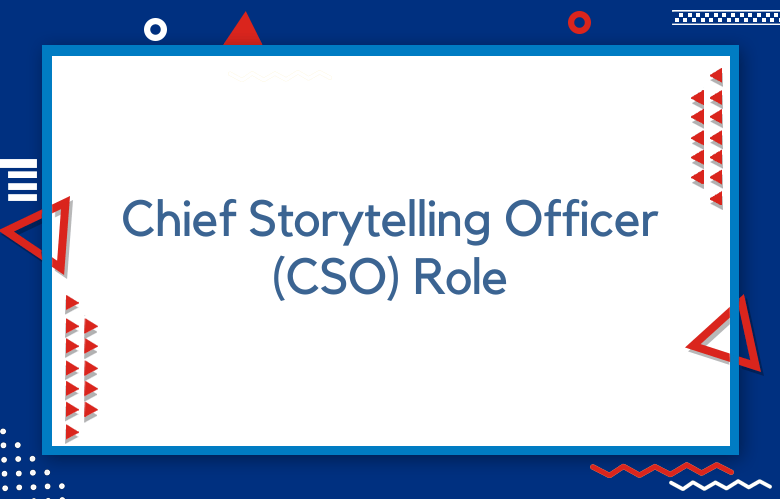Chief Storytelling Officer (CSO) Role and Responsibilities

The Chief Storytelling Officer (CSO) is a unique and increasingly important role within organizations of all sizes. This individual is responsible for developing, curating, and maintaining the organization’s narrative, ensuring the company’s values, mission, and vision are communicated consistently and effectively across all channels.
Chief Storytelling Officer (CSO) Role and Responsibilities
Building strong emotional connections with customers is more important than ever in today’s digital age. Customers are bombarded with marketing messages and advertising, and they are increasingly discerning and demanding. To stand out from the competition and create a loyal customer base, organizations must find ways to connect with customers on an emotional level.
This is where the Chief Storytelling Officer (CSO) comes in. The CSO can help organizations build strong emotional connections with their target audience by crafting and sharing engaging and authentic stories. Here are some reasons why companies need a CSO to develop emotional connections with their customers:
The CSO’s role encompasses a wide range of responsibilities, including
Developing the Organization’s Narrative
The CSO works closely with senior leaders to develop a compelling narrative for the organization that resonates with employees, customers, and stakeholders. This narrative should be cohesive, authentic, and aligned with the organization’s strategic goals and values.
Creating Engaging Content
The CSO is responsible for creating engaging content that tells the organization’s story in an inspiring, memorable way and is accessible to a broad audience. This content may include blog posts, social media content, videos, podcasts, or other forms of storytelling.
Managing the Organization’s Brand Identity
The CSO ensures that the organization’s brand identity is consistent across all communication channels, from social media to marketing materials. This involves developing and maintaining style guides, tone of voice guidelines, and other brand standards.
Master of Storytelling: The Vital Role of a Chief Storytelling Officer
As consumers become more discerning and demanding, and as competition intensifies, organizations must differentiate themselves and establish a strong brand identity. This is where the CSO comes in. By leveraging the power of storytelling, the CSO can help organizations create a compelling narrative that resonates with their target audience, builds brand loyalty, and drives business success.
The CSO’s role involves more than creating and sharing stories. It also involves building relationships with key stakeholders, measuring storytelling’s impact on the organization’s brand and business performance, and ensuring that the organization’s narrative is consistent across all communication channels.
In a world where consumers are bombarded with marketing messages and advertising, the CSO’s role in creating a compelling and authentic narrative is more vital than ever. By tapping into stories’ emotional and cognitive power, the CSO can help organizations stand out from the crowd, build stronger connections with their audience, and drive business growth.
Unleashing the Power of Narratives: The CSO’s Impact on Branding
In today’s crowded marketplace, establishing a strong and distinctive brand is critical for businesses seeking to stand out. The Chief Storytelling Officer (CSO) plays a vital role in creating and sharing the organization’s narrative, which is essential for building a solid and cohesive brand identity.
The CSO’s impact on branding is multifaceted. Here are some key ways in which the CSO can help organizations build and strengthen their brand:
Defining the Brand Story
The CSO works closely with the organization’s leadership to define the brand story, capturing the essence of the brand’s stand, unique selling proposition, values, and mission. This story serves as the foundation for all branding efforts and helps differentiate the brand from competitors.
Developing Brand Messaging
The CSO is responsible for developing consistent and compelling messaging that aligns with the brand story. This messaging is used across all communication channels, from social media to advertising, and helps to create a cohesive brand identity that resonates with the target audience.
Building Brand Loyalty
By sharing engaging and authentic stories, the CSO can help to build strong emotional connections with the target audience, fostering brand loyalty and advocacy. These stories can highlight the organization’s mission, values, and impact and feature real-life examples of how the brand has made a difference in the lives of its customers or the community.
Creating a Distinctive Brand Voice
The CSO helps create a distinctive brand voice that is sent across all communication channels. This voice reflects the brand’s personality, values, and mission and helps create a cohesive and memorable brand identity.
Enhancing the Customer Experience
By crafting engaging and compelling stories, the CSO can enhance the customer experience, making it more memorable, enjoyable, and emotionally resonant. This can help to create a loyal customer base and drive repeat business.
Beyond Marketing: How CSOs Drive Business Success through Storytelling
Traditionally, branding and marketing have focused on promoting products and services through advertising, social media, and other channels. However, in today’s crowded marketplace, consumers are more likely to engage with brands that resonate with their values and beliefs. This is where the CSO comes in.
By crafting and sharing stories that connect with consumers emotionally, the CSO can help organizations create a unique and compelling narrative that sets them apart from the competition. This narrative can be woven into all aspects of the organization’s branding, from its mission and values to its products and services, creating a cohesive and authentic brand identity.
Crafting Compelling Narratives: The CSO’s Crucial Responsibility
The Chief Storytelling Officer (CSO) is a unique and increasingly important role within organizations seeking to build solid connections with their target audience and drive business success.
By leveraging the power of storytelling, the CSO can help organizations create a compelling narrative that sets them apart from the competition, fosters brand loyalty, and enhances the customer experience.
Here are some key ways in which the CSO can drive business success:
Differentiating the Brand
By crafting and sharing stories that capture the brand’s essence, the CSO can help differentiate the organization from its competitors. This differentiation can be based on a unique selling proposition, mission, values, or impact and can help to create a distinctive and memorable brand identity.
Building Brand Loyalty
Engaging and authentic stories can help to build strong emotional connections with the target audience, fostering brand loyalty and advocacy. The CSO can create a sense of connection and belonging by sharing stories that resonate with the audience, leading to repeat business and positive word-of-mouth marketing.
Enhancing the Customer Experience
The CSO can enhance the customer experience by creating engaging and compelling stories that make the experience more memorable, enjoyable, and emotionally resonant. This can increase customer satisfaction, repeat business, and positive online reviews and testimonials.
Driving Innovation
The CSO can drive innovation within the organization by fostering a storytelling culture and encouraging employees to share their stories and ideas. This can lead to new product or service ideas, process improvements, and other innovations that drive business growth.
Measuring the Impact of Storytelling
Using data and analytics, the CSO can measure storytelling’s impact on key business metrics, such as customer engagement, retention, and lifetime value. This data can be used to optimize storytelling efforts and allocate resources effectively.
Conclusion
The Chief Storytelling Officer (CSO) is a valuable addition to any organization seeking to enhance its brand identity, build stronger connections with its target audience, and drive business growth through the power of storytelling. By leveraging storytelling across all channels, the CSO can help organizations create a compelling narrative that resonates with their audience, builds brand loyalty, and drives business success.
As organizations increasingly recognize the importance of storytelling in building a stronsoliddistinctive brand, the role of the CSO is likely to become even more crucial in the future. By championing storytelling across all aspects of the organization, the CSO can help organizations tap into stories’ emotional and cognitive power to create a more engaged and loyal customer base.



